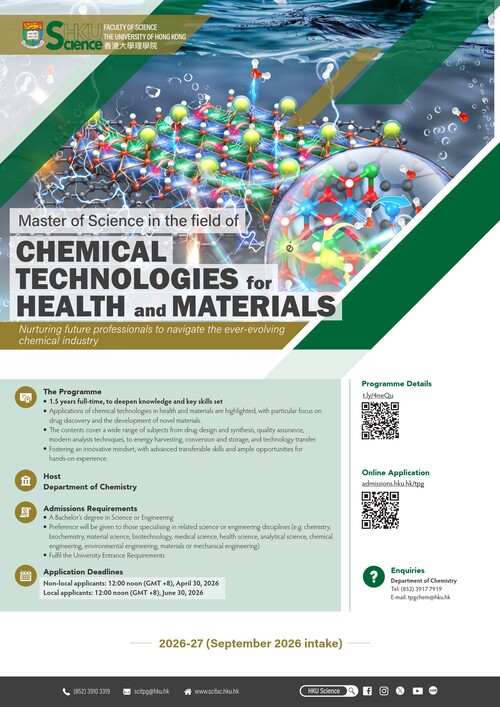We aim to deliver the next level of operational excellence in the chemical-related industries. By integrating practical skills with theoretical knowledge, this programme acts as a conduit to provide interdisciplinary training to talents with a strong science foundation and to equip them with up-to-date chemistry knowledge, laboratory skills, and an innovative mindset.
Admission Requirements
- To be eligible for admission to the programme, you should have a Bachelor's degree in Science or Engineering;
- Preference will be given to those specialising in related science or engineering disciplines (e.g. chemistry, biochemistry, material science, biotechnology, medical science, health science, analytical science, chemical engineering, environmental engineering, materials or mechanical engineering) ;
- Applicants shall pass a qualifying examination if deemed necessary;
- Fulfil the University Entrance Requirements.
For 2026-27 intake:
Applications open on October 27, 2025. Applications are considered continuously, and early application is advantageous. The closing dates for non-local and local applications are 12:00 noon (GMT +8), April 30, 2026 and 12:00 noon (GMT +8), June 30, 2026 respectively.
For non-local students, they are advised to apply as early as possible to ensure completing all entry visa requirements prior to the commencement of the programme (It may take up to 3 months to process the entry visa).
► Articulation Pathways to HKU Science Full-time Taught Postgraduate Programmes
Fees for 2026-27 intake:
The tuition fee for the programme is HK$273,000* for the 2026-27 intake. The fee shall normally be payable in three instalments over 1.5 years for full-time study.
In addition, students are required to pay Caution Money (HK$350, refundable on graduation subject to no claims being made) and Graduation Fee (HK$350). With effect from 2022-23, all full-time students will be charged a student activity fee of HK$100 per annum to provide support for activities of student societies and campus wide student events.
* Subject to approval
Programme Highlights
Our chemistry-empowered, innovative and comprehensive MSc programme aims to strengthen students’ knowledge to cope with ever-evolving challenges in the health and materials industries.
What will this MSc give you?
- A comprehensive coverage on applications of chemical technologies in health and materials, with particular focus on drug discovery and development of novel materials
- A wide range of compulsory and elective courses from drug design and synthesis, quality assurance, modern analysis techniques, to energy harvesting, conversion and storage, and technology transfer
- An environment to foster an innovative mindset, with training in advanced transferable skills and ample opportunities for hands-on experience
A. Programme Structure
To be eligible for the award of the MSc in the field of Chemical Technologies for Health and Materials, students shall complete at least 72 credits of courses. They must enroll in 5 courses (30 credits in total) of "compulsory courses" and take at least 18 credits of courses out of a broad range of "disciplinary electives". In addition, students must carry out a “capstone project” by enrolling in the 24-credit course CTHM8102. They are encouraged to approach faculty members in their areas of interest as soon as possible, in order to choose an appropriate project.
| Master of Science in the field of Chemical Technologies for Health and Materials | |
|---|---|
| Compulsory Courses (30 credits) | |
| CTHM7101 | Advanced chemical instrumentation and data analysis (6 Credits) |
| CTHM7104 | Frontiers in modern materials (6 Credits) |
| CTHM7105 | Innovation, technology transfer and entrepreneurship (6 Credits) |
| CTHM7106 | Bioanalytical methods: principles and diagnostic applications (6 Credits) |
| CTHM8101 | Research and development seminar (6 Credits) |
Disciplinary Electives Courses (18 credits) | |
| CTHM7102 | Synthesis for drugs and advanced materials (6 Credits) |
| CTHM7103 | New technologies and applications chemical biology (6 Credits) |
| CTHM7107 | Green and sustainable chemistry (6 Credits) |
| CTHM7108 | Quality assurance and regulatory compliance (6 Credits) |
| *CTHM7109 | Big data analysis in analytical science (6 Credits) |
| *COMP7404 | Computational intelligence and machine learning (6 Credits) |
| *STAT8017 | Data mining techniques (6 Credits) |
| CHEM7110 | Advanced materials (6 Credits) |
| CHEM7111 | Medicinal chemistry (6 Credits) |
| *CTHM7109, COMP7404 and STAT8017 are non-permissible combination. Students are only permitted to take either one of these courses. | |
| Capstone Requirement (24 credits) | |
| Research project and dissertation (24 Credits) | |
B. Course Description
| Compulsory Courses |
|---|
CTHM7101 Advanced chemical instrumentation and data analysis (6 credits)The aim of this course is to provide students with an understanding of advanced modern chemical instrumentation, covering both fundamental principles and practical aspects of instrument design for qualitative and quantitative chemical analysis. The course emphasises bridging theory and practice to address real-life problems. The frontiers in mass spectrometry analysis, computer-assisted drug discovery technologies and machine learning for chemical analysis will be discussed.
Assessment: Coursework (50%); Examination (50%) |
CTHM7104 Frontiers in modern materials (6 credits)This course provides an in-depth exploration of modern materials chemistry, with a focus on bridging fundamentals and practical applications. The topics include functional materials and nanodevices for energy conversion and storage, environmental issues, biomedicine, and optoelectronics. The course also covers the fundamentals of materials chemistry, design strategies, synthesis, device preparation, and characterisation. Throughout the course, students will learn about the latest techniques used in materials chemistry and gain hands-on experience. Assessment: Course work (50%); Examination (50%)
Assessment: Course work (50%); Examination (50%) |
CTHM7105 Innovation, technology transfer and entrepreneurship (6 credits)This course provides students with exposure to how science/technology start-ups are conceived and established. From laboratory scientific research results to effective technology concepts and products, students who are interested in technology transfer and entrepreneurship need to build up a spectrum of knowledge and practical experiences from technology analyses, product ideation, value evaluation, business plan, IP preparation, all the way to team building, funding raising and go-to-market strategy. Students in this course will obtain an essential understanding of how tech start-ups are built and become successful, which is a key introductory step in becoming future technology transfer professionals and entrepreneurs.
Assessment: Course work (100%) |
CTHM7106 Bioanalytical methods: principles and diagnostic applications (6 credits)This course provides an overview of bioanalytical methods for disease diagnostics and sensing applications. The course content covers the principles and applications of modern bioanalytical techniques. Selected topics include chemistry of MRI and contrast agents; point-of-care testing; microfluidics; mass spectrometry; next-generation DNA sequencing and other nucleic-acid-based analysis; and separation science. Other emerging technologies and the latest development in bioanalytical chemistry will also be discussed.
Assessment: Course work (50%); Examination (50%) |
CTHM8101 Research and development seminar (6 credits)The course consists of a series of seminars, which are designed to acquaint students with the latest advancements and developments in chemical technologies that are relevant to health, well-being, materials synthesis and analysis. The seminar series will cover topics such as the latest advancements in chemical technologies, new materials and their applications, synthesis and analysis techniques, biochemical processes involved in drug discovery and development, and other related topics. Students will present their literature research and findings in class and receive feedback from their peers and instructors.
Assessment: Course work (100%) |
| Disciplinary Elective Courses |
|---|
CTHM7102 Synthesis for drugs and advanced materials (6 credits)This course provides a comprehensive training in synthetic methods that are applicable to the preparation of pharmaceuticals and organic materials. Current organic transformations, including oxidations/reductions, substitutions, enolate chemistry and transition metal-catalyzed transformations will be covered. A focus of this course is the application of these methods in the synthesis of drugs and materials, with discussions on multiple examples in both academic studies and industrial manufacturing
Assessment: Course work (50%); Examination (50%) |
CTHM7103 New technologies and applications chemical biology (6 credits)This course covers state-of-the-art advancements in technologies to probe chemistry in cells, with a primary focus on the latest developments and applications of technologies for examining cellular processes, molecular interactions and their implications in biology and medicine. The novel technologies probing cellular chemistry using chemical biology, synthetic biology, and genome engineering methodologies, as well as techniques for single-cell analysis, microscopy and mass spectrometry analysis will be discussed. Extensions of these application
Assessment: Course work (50%); Examination (50%) |
CTHM7107 Green and sustainable chemistry (6 credits)The principles and practices of green chemistry, focusing on renewable energy, green catalysis and carbon neutrality will be discussed. The course covers the chemistry underlying renewable energy technologies; green catalysis in the synthesis of important chemicals, such as pharmaceuticals and polymers; and investigates the concept of carbon neutrality such as carbon capture and storage. Through a combination of lectures, readings, and case studies, students will learn about the principles and applications of green chemistry, as well as the environmental and economic benefits of this approach.
Assessment: Course work (50%); Examination (50%) |
CTHM7108 Quality assurance and regulatory compliance (6 credits)A good grasp of effective practices to maintain service quality and adhere to government legislation and regulatory guidelines is vital for entering the industry. Building upon basic metrology concepts and techniques used in quality control, this course aims to provide a thorough understanding of the principles and requirements for both management and technical aspects of the international standard ISO/IEC 17025:2017, along with other management standards such as Good Laboratory Practice (GLP) and Good Manufacturing Practice (GMP). Practical guidelines for establishing, implementing and maintaining a quality management system for laboratory operation are given. Requirements for internal and external audits as stipulated in ISO/IEC 17025:2017, and criteria from accreditation bodies such as Hong Kong Accreditation Service (HKAS) and China National Laboratory Accreditation Committee (CNAS) are also addressed. Extensions of these concepts in clinical trials will be introduced. Emphasis is also placed on technical requirements for different disciplines.
Assessment: Course work (100%) |
CTHM7109 Big data analysis in analytical science (6 credits)This course focuses on the application of big data analytics in analytical chemistry, health and materials sciences. It introduces students to the principles of big data analytics, current challenges, most recent developments and opportunities presented in the field. Case studies on big data analytics in chemistry, including the use of advanced analytics in the areas of drug discovery, diagnosis, materials development and environmental analysis will also be discussed. Impermissible Combination: Students should not be taking or have taken STAT8017 Data mining techniques or COMP7404 Computational intelligence and machine learning
Impermissible Combination: Students should not be taking or have taken STAT8017 Data mining techniques or COMP7404 Computational intelligence and machine learning
Assessment: Course work (100%) |
STAT8017 Data mining techniques (6 credits)With the rapid developments in computer and data storage technologies, the fundamental paradigms of classical data analysis are ripe for change. Data mining techniques aim at helping people to work smarter by revealing underlying structure and relationships in large amounts of data. This course takes a practical approach to introduce the new generation of data mining techniques and show how to use them to make better decisions. Topics include data preparation; feature selection; association rules; decision trees; bagging; random forests and gradient boosting; cluster analysis; neural networks; and introduction to text mining. Impermissible Combination: Students should not be taking or have taken CTHM7109 Big data analysis in analytical science or COMP7404 Computational intelligence and machine learning
Assessment: Course work (100%) |
COMP7404 Computational intelligence and machine learning (6 credits)This course will teach a broad set of principles and tools that will provide the mathematical, algorithmic and philosophical framework for tackling problems using Artificial Intelligence (AI) and Machine Learning (ML). AI and ML are highly interdisciplinary fields with impact in different applications, such as biology, robotics, language, economics and computer science. AI is the science and engineering of making intelligent machines, especially intelligent computer programmes, while ML refers to the changes in systems that perform tasks associated with AI. Ethical issues in advanced AI and how to prevent learning algorithms from acquiring morally undesirable biases will be covered. Topics may include a subset of the following: problem solving by search, heuristic (informed) search, constraint satisfaction, games, knowledge-based agents, supervised learning, unsupervised learning; learning theory, reinforcement learning and adaptive control and ethical challenges of AI and ML. Impermissible combination: Students should not be taking or have taken CTHM7109 Big data analysis in analytical science or STAT8017 Data mining techniques Topics may include a subset of the following: problem solving by search, heuristic (informed) search, constraint satisfaction, games, knowledge-based agents, supervised learning, unsupervised learning; learning theory, reinforcement learning and adaptive control and ethical challenges of AI and ML.
Impermissible combination: Students should not be taking or have taken CTHM7109 Big data analysis in analytical science or STAT8017 Data mining techniques
Assessment: Course work (50%); Examination (50%) |
CHEM7110 Advanced materials (6 credits)This course gives a comprehensive overview of materials chemistry. It focuses on the application of materials in advanced technology for renewable energy, catalytic devices, sustainable resourcification, wearable biosensors, nanoelectronics, membrane technology and other specialty applications. The most recent developments, synthesis, and characterisation in materials chemistry will also be discussed.
Assessment: Course work (50%); Examination (50%) |
CHEM7111 Medicinal chemistry (6 credits)This course covers the chemical principles of drug design and drug action. It discusses the drug discovery, design, and development, as well as drug metabolism, prodrugs and drug delivery. It serves as an introduction to the current development of bioorganic/inorganic chemistry, pharmaceutical chemistry, and biotechnology.
Assessment: Course work (50%); Examination (50%) |
| Capstone Requirement |
|---|
CTHM8102 Research project and dissertation (24 credits)The Research Project and Dissertation provides students with the opportunity to conduct original research and development projects in the field of chemistry and related areas. Students will work with experienced faculty members to conduct advanced independent research projects in areas such as biomaterials, drug delivery, biocatalysis, green synthesis and analytical chemistry, which will be the basis of their thesis. The course provides comprehensive training in designing and conducting experiments, data analysis and critical thinking. Students will also learn how to analyse experimental data, and write a high-quality research thesis. This course includes lectures, seminars, laboratory work and independent research, which provides students with advanced knowledge of chemical regulations and safety. It also enables students to apply scientific principles, data analysis and other transferable skills in real-world scenarios. The course provides comprehensive training in designing and conducting experiments, data analysis, and critical thinking. Students will also learn how to analyse experimental data, and write a high-quality research thesis. This course includes lectures, seminars, laboratory work, and independent research; which provides students with advanced knowledge of chemical regulations and safety. It also enables students to apply scientific principles, data analysis, and other transferrable skills in real-world scenarios.
Prerequisite: CTHM8101 Research and Development Seminars
Assessment: Course work (100%)
|
Programme Director

Professor Zheng Xiao GUO
Chair Professor, Department of Chemistry
BSc Northeastern; PhD Manchester
Programme Coordinators
Dr Angela Mai-Yan YUEN
Lecturer, Department of Chemistry
BSc HKUST; PhD HKU
Dr Kenneth King-Hei NG
Lecturer, Department of Chemistry
MA, MSci, PhD Cambridge
Dr Arnold Tin-Lok LI
Assistant Lecturer, Department of Chemistry
BSc, PhD HKUST
Staff List
- Professor Chi-Ming CHE, BSc, PhD HKU
- Professor Hongzhe SUN, BSc Huabei; MSc CAS Wuhan; PhD London
- Professor Vivian Wing-Wah YAM, BSc, PhD HKU
- Professor Guanhua CHEN, BSc Fudan; PhD Caltech
- Professor Pauline CHIU, BSc, PhD Toronto
- Professor Zheng Xiao GUO, BSc Northeastern; PhD Manchester
- Professor Xiang David LI, BSc Fudan; PhD HKU
- Professor Xiaoyu LI, BSc Peking; PhD Chicago
- Professor Xuechen LI, BSc Nankai; MSc Alberta; PhD Harvard
- Professor Ho Yu AU-YEUNG, BSc, MPhil CUHK; PhD Cambridge
- Professor Aspen Xiao-Yang CHEN, BSc Fudan; PhD Princeton
- Professor Ivan K CHU, BSc Victoria; PhD CityUHK
- Professor Haibo JIANG, BSc Shanghai Jiao Tong University; PhD Oxford
- Professor Victor LEE, MBBS HK; MD HK; FRCR, FHKCR, FHKAM (Radiology)
- Professor Kou OKURO, BSc Keio; MEng, PhD Tokyo
- Professor Jinyao TANG, BA USTC; PhD Columbia
- Professor Patrick Henry TOY, BSc Ohio State; PhD Wayne State
- Professor Jian HE, BSc Zhejiang; PhD Scripps
- Professor Zhongxing HUANG, BSc Peking; PhD Chicago
- Professor Seungkyu LEE, BSc SKKU; MSc KAIST; PhD UC Berkeley
- Professor Ying LI, BSc Tsinghua; PhD Ilinois
- Professor Philip Yong-Xin LI, BSc Peking; PhD HKUST
- Professor Junzhi LIU, BSc Hebei; MSc Sichuan; PhD Mainz
- Professor Edmund Chun Ming TSE, BSc Virginia; PhD Illinois
- Professor Yufeng WANG, BSc Peking; PhD NYU
- Professor Jun YANG, BSc, MSc Peking; PhD Köln
- Dr Angela Mai-Yan YUEN, BSc HKUST; PhD HKU
- Dr Kenneth King-Hei NG, MA, MSci, PhD Cambridge
- Dr Arnold Tin-Lok LI, BSc, PhD HKUST
Enquiries
Department of Chemistry The University of Hong Kong
| Faculty of Science The University of Hong Kong
|




